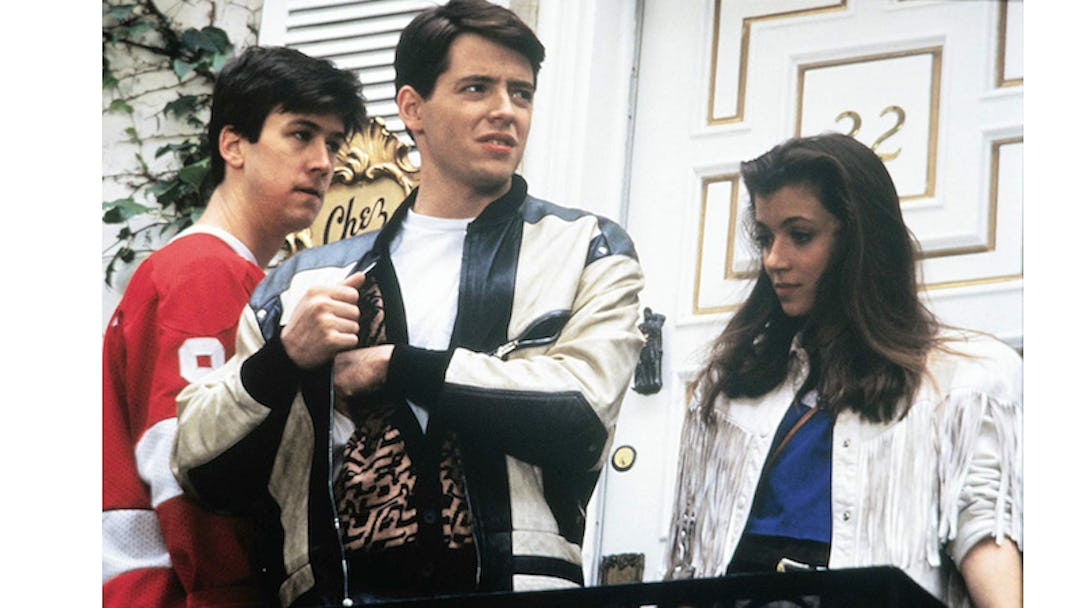If 18 is the age of legal adulthood and 40 is the midpoint between life and death, 30 is a mushier milestone. At 30, there’s no denying the velocity at which you’re being hurled toward middle age, although you haven’t quite shaken off your inner teenager. Ferris Bueller’s Day Off, which turns 30 today, is a celebration and a warning, a movie frozen in the moment just before shit gets real. Ferris is an ode to the wisdom of youth — the idiot passion of being young and restless. The film may have reached the age of official adulthood, but thanks to the beauty of movies, Ferris Bueller will be 17 forever.
Like all John Hughes’s teen movies (Sixteen Candles, The Breakfast Club, Pretty in Pink), Ferris is set in the fictional Shermer, Illinois, a hyper-ordinary suburb of Chicago. And like those movies, its premise is brilliant in its simplicity: A modern-day Peter Pan (Matthew Broderick) on the verge of graduation schemes to skip school. His accomplices are his best friend, Cameron (Alan Ruck), and girlfriend, Sloane (Mia Sara). His younger sister, Jeannie (Jennifer Grey), and high-school principal Ed Rooney (Jeffrey Jones) are his foils.
Hughes was always sensitive to the plight of being a teenager. Tonally, Ferris is a deceptively complex movie, joyous but with a current of dread bubbling beneath its peppy surface. Ferris’s middle-class, suburban life is comfortable but stifling; the wood-paneled walls of the high-school classroom might as well be prison bars. He has a big room filled with stereo equipment and a computer, but what he really wants is a car. He wants out.
Hughes deifies the ordinariness of Ferris’s world — stylistic flourishes heighten a setting that’s realistic to the point of being mundane. From the very start, we’re treated to a Ferris-eye-view: When he blurs his eyes, feigning illness, the camera’s lens blurs, too. His bratty sister is reduced to a tapping foot and a manicured hand drumming her crossed arms. When his family leaves, he talks to the camera, outlining his plan of attack. Ferris is the Battle of Algiers of skipping school, an instruction manual for youth revolt set in the bubble of 1980s suburban America.
The film speaks the language of youth, particularly in the context of its 1986 premiere. Like an ’80s teen referencing the pop culture of his childhood, the film ironically quotes the theme songs of Star Wars and I Dream of Jeannie. Choreographed dance sequences turn a parade scene into a music video, and zippy editing hurls the action forward at a pace that seems designed for the attention span of someone under 18.
But Hughes is also attuned to the complexity of the teenage mind. In the sequence at the Art Institute of Chicago, he captures the melancholy of leaving childhood behind: Cameron, Ferris, and Sloane walk through the gallery holding hands with a group of school kids. Then, Ferris and Sloane share a romantic moment in front of a blue stained-glass window, while the anxiety-ridden Cameron stares into a pointillist painting, the figures losing shape as the camera zooms in.
Hughes takes his young subjects seriously — their anguish and anxiety, their joys and desires. He doesn’t make light of Sloane and Ferris’s romance, but treats it with respect (Hughes married his own high school sweetheart). These teenagers aren’t flat clichés, but complex people. “There’s nothing he can’t handle,” Cameron says to Sloane, while Ferris is off dancing on a parade float. “I can’t handle anything. School, parents, future — Ferris can do anything.” “What are you interested in?” Sloane asks. “Nothing.” She smiles. “Me neither.”
They seem so adult, so wise, compared to the impish Ferris. Hughes cast the almost 30-year-old Ruck opposite the 23-year-old Broderick, as if to draw attention to Ferris’s youth. Cameron may come off as the mature one compared to the reckless Ferris, but the movie suggests it’s Ferris who knows what’s up. He’s wiser than all of them — Cameron, who finally lets loose thanks to his friend’s influence; Jeannie, who spends the day trying to bust her brother, only to end up covering for him rather than side with Rooney; and, of course, Rooney, the human incarnation of rules, and thus the perfect foil for Ferris. Like another pathetic principal in a Hughes film, The Breakfast Club’s Richard Vernon, Rooney relishes the idea that Ferris will pay for his transgressions when he’s all grown up and miserable, like he is.
But Ferris is a battle cry for the young and old alike against accepting that fate. The film has aged so well because it’s young at heart: Ferris’s day off is symbolic of both the freedom of adulthood and the simple delights of childhood. On the surface it’s a teen movie, but its meaning deepens when you watch it as an adult. Life does move pretty fast. We should take more days off.
